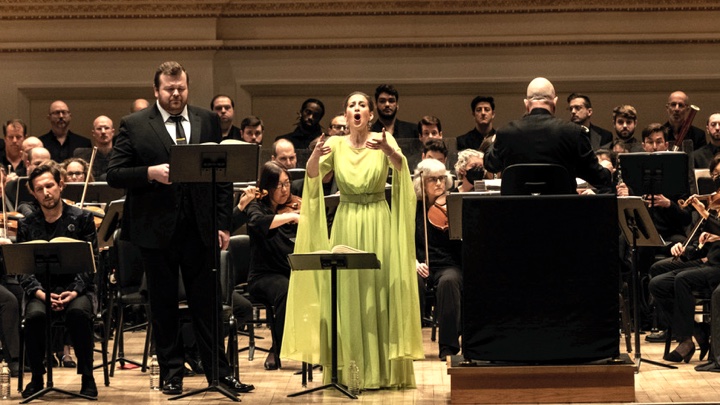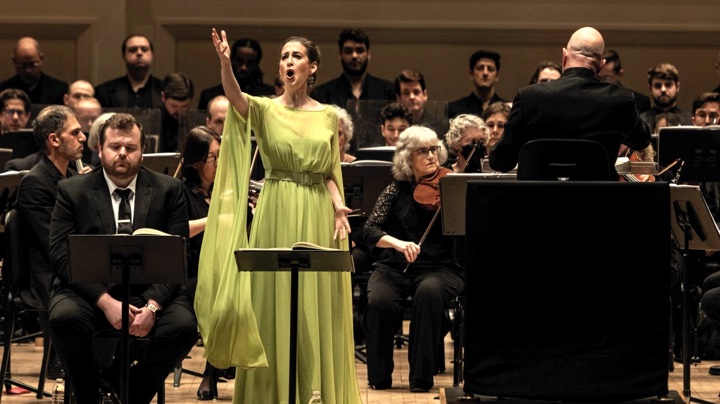
A year later, Renée Fleming introduced her virginal tree-hugger in a Fall 2005 Carnegie Hall concert version led by Semyon Bychkov with Johan Botha, Roberto Saccà and the WDR Symphony Orchestra of Cologne in tow. That three-city tour was tied to a London/Decca recording of the opera with much the same personnel that was released around the same time.
As part of the Lincoln Center Festival in Summer 2015, the Cleveland Orchestra presented another concert version under the baton of Franz Welser-Möst featuring less starrily glamorous singers who nonetheless were more musically and stylistically attuned to the work: soprano Regine Hangler, tenor Norbert Ernst and in his first New York appearance, heldentenor Andreas Schager, a tireless, stentorian energizer bunny in the unsingable role of Apollo.
Last Thursday night (March 23) the American Symphony Orchestra presented another concert version at Carnegie Hall conducted by Dr. Botstein. This followed in the steps of Dr. Botstein’s traversals of other Richard Strauss rarities like Feuersnot, Friedenstag, Die Liebe der Danae, two versions of Die ägyptische Helena and the 2022 Bard Summerscape staged opera Die schweigsame Frau which introduced many of us to Jana McIntyre, the Daphne of last Thursday’s concert.
Strauss’ “Bucolic Tragedy in One Act” Daphne is one of his most beautiful and most frustrating works. Composed during the dominance of the Nazi party in the build-up to World War II, it is a hymn to peace and a rejection of violence urging the embrace of nature and love. It pits the Dionysian against the Apollonian (the work has an almost neoclassical bent with a classical subject derived from Ovid’s Metamorphoses), with the Apollonian prevailing at the climax.
Prior to World War I, Strauss composed two highly dissonant Dionysian dramas (Salome and Elektra) which scandalized the opera world. Having survived World War I and dreading the Second World War looming on the horizon, Strauss longed to return to the tonal and classical in Daphne in an escape from the turbulent and destructive times he lived in.
Daphne is a child-woman who wishes to remain innocent and virginal forever and feels a close affinity to nature. Her maturing beauty has caused her childhood playmate Leukippos to develop more than fraternal feelings for her which she rejects.
During the Festival of Dionysus, Leukippos disguises himself as a girl and dances with Daphne. The god Apollo takes the guise of a human herdsman and joins the shepherds. The god is dazzled by Daphne’s beauty and resolves to possess her. Her attraction to the disguised Leukippos arouses his jealousy and after a confrontation with the boy, he kills him with a thunderbolt.
Daphne is driven to the deepest guilt and despair, not realizing the depth of her emerging feelings for her childhood playmate. In pity, Apollo raises Leukippos to Mount Olympus as flute player to the gods and turns the innocent Daphne into a tree, so her beauty will never fade over time.
Josef Gregor’s libretto is abstruse and static with characters who remain concepts of human beings rather than living individuals. (Paging Hugo von Hoffmansthal!) The static dramaturgy contains scenes of magic like Apollo’s thunderbolt and Daphne’s metamorphosis which are difficult to stage; the work is in many ways better suited to the concert stage where the evocative orchestral tone painting can do the heavy lifting.
Much of Strauss’ music radiates abstract beauty with ravishing orchestral textures but few melodies emerge during the long vocal monologues and dramatic scenes like the murder of Leukippos can be pat and flat. There is a certain amount of note-spinning going on.
As almost always, Strauss saves his best for last: the final scene of Daphne transformed into a tree is one of Strauss’ most ethereal and shatteringly beautiful inspirations. The soaring soprano tones of Daphne’s final lament merge into the pulsating strings in a wordless vocalise as her physical being is transformed into the wind sighing through the branches of a tree. As in Der Rosenkavalier, Salome and Capriccio, the final scene lifts the entire work into another sphere of operatic inspiration led by the higher female voice. Beverly Sills introduced many of us to this music in her famous recording:
Another factor in the work’s rarity is the difficulty of the vocal writing. Daphne has a very high tessitura requiring a delicate tone that can project over a large orchestration. Her mother Gaea is a deep contralto role requiring low E’s. The heldentenor role of Apollo requires constant declamation around the upper break (passaggio) in the punishing tenor-killing style of Strauss’ Bacchus and the Kaiser in Die Frau ohne Schatten.The lyric-coloratura soprano Jana McIntyre, a singer who is in the early stages of her career, nonetheless sang the role of Daphne with quiet command and complete vocal poise. Her frequent ascents into the soprano stratosphere were on pitch and without strain. Her tone is almost instrumental (which is what Daphne’s music becomes at the final climax) with a slender tone, placed extremely high with little to no vibrato. Her sound is childlike, sexless and untethered to the earth as Daphne is as a character.
Strauss contrasts her suitors utilizing a lyric tenor for Leukippos and a more heroic tenor for Apollo. Aaron Blake as Leukippos reaffirmed his status as one of our most versatile and accomplished young lyric tenors. The rapt way he listened to the orchestral passages onstage revealed deep sensitivity and response to the music before his character had a line to sing. Blake also reacted to the other singers with dramatic intention. His clear, well-produced tenor was incisive with many moments of sweetness and beauty.
Emerging heldentenor Kyle van Schoonhoven is another young singer in the earliest stages of his professional career exposed in a punishing assignment. His sound is plangent with a smooth patina of youthful bloom and warm glow. Wagnerian steel has not yet taken over the tone. The ductility of his voice made his ascents into the upper register less worn or effortful as other exponents of Apollo and he does not shout.
However, the tone can turn blunt, nasal and narrow when pressure is applied – as it often was. This was a promising debut though careful maturation and further experience is needed. Nonetheless his warm, clear voice made a generally pleasing impression.
Bass Stefan Egerstrom as Daphne’s venerable father Peneios also was youthful and fresh sounding with a resonant, responsive voice full of juice. Mezzo-contralto Ronnita Miller showed the virtues of experience in the wise maternal role of Gaea. Her tone is warm and enveloping.
As with Eve Queler of Opera Orchestra of New York, it has become a fashionable trope to lament Leon Botstein’s conducting skills on the podium while granting him some grudging gratitude for allowing us to hear rare opera repertory in live performance. Well, Dr. Botstein has kept at it like a fiend covering a huge swath of repertory – and unlike other conductors, his skills have improved immeasurably over time.
Now, he isn’t the most versatile of conductors – his German and Slavic repertory is better than his Romantic French or Italian opera. No Offenbach or Donizetti for him. But in post-Romantic middle-European 20th century opera he is damned good. Richard Strauss fits into that category.
Though the American Symphony Orchestra is not as renowned an ensemble as the Cleveland Orchestra, their playing was beautiful – full of diaphanous string textures layered over each other retaining clarity while gaining in complexity. The Cleveland Orchestra under Welser-Möst had a more golden sonority with an autumnal post-Romantic glow while Dr. Botstein and the ASO had a silvery clarity with darker shadows emerging from the depths. I loved both.
The opera was preceded by the New York premiere of an a capella choral work An den Baum Daphne which Strauss adapted in 1943 from a proposed choral finale for Daphne for which he had Gregor expand his verses to make a fifteen-minute concert work. Composed during the darkest days of the second world war, Strauss’ choral work is drenched with elegiac grief.
His beloved collaborator, the Jewish author Stefan Zweig (librettist of Die schweigsame Frau and his original choice to write the Daphne libretto thwarted by the Nazis) had committed suicide in exile. The work was performed as a prologue to Daphne. (Botstein wisely realized that nothing could top Daphne’s final scene.)
The Bard Festival Chorale is an ad hoc ensemble drawn from local professional choral singers – several individual names were familiar from local choruses. Their sound was not as homogenous as more established groups used to working together. Sometimes there was a tentativeness in attack and blend that betrayed their inexperience together. Nonetheless this chorus shares much of the sound world of Strauss’ Daphne which it evokes with resigned melancholy and loss. Yet another Botstein discovery.
Tonight, the Metropolitan Opera will unveil its latest revival of Der Rosenkavalier and we will once again revel in the radiant light and elusive shadow of Richard Strauss’ magic.
Photos by Matthew Dine



